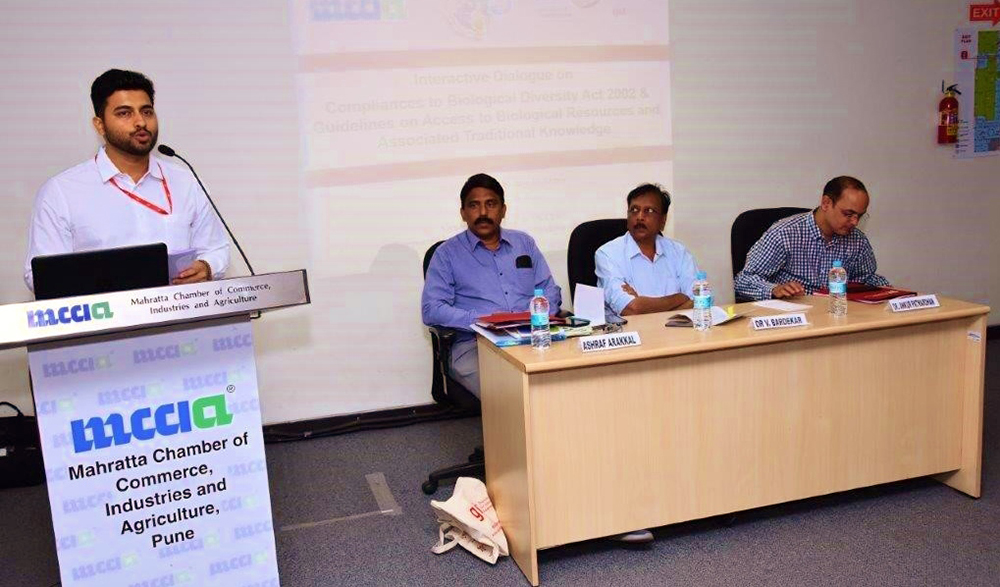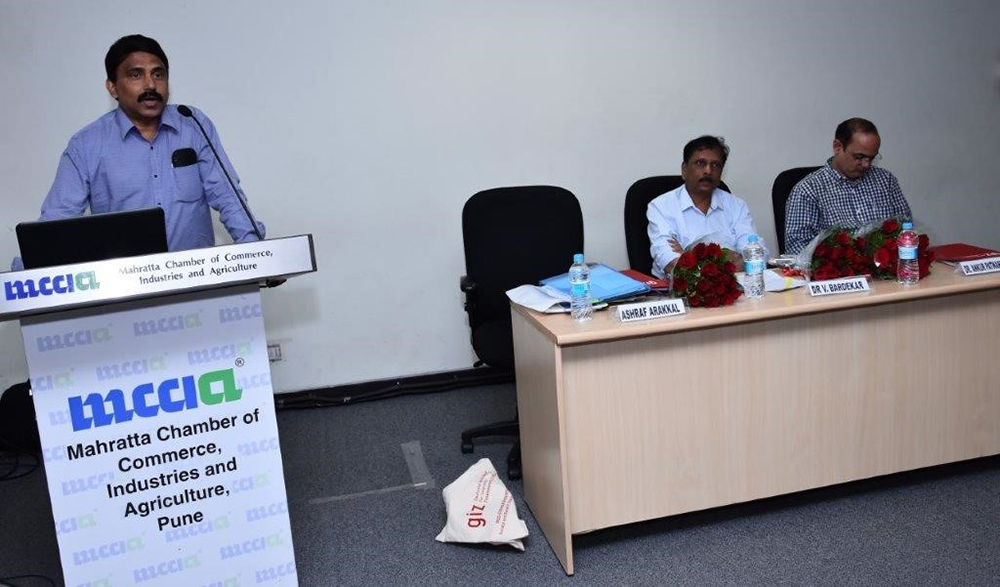07 Mar, 2019
The ABS Partnership Project in collaboration with Maharashtra State Biodiversity Board (MSSB) and Marattha Chamber of Commerce Industries and Agriculture (MCCIA) organised a half-day workshop on facilitating compliance on the Biodiversity Act, 2002 and 2014 Guidelines on Access and Benefit Sharing and associated traditional knowledge from users of bio-resources bases in Maharashtra. The event was organised at MCCIA head office in Pune on 7th March 2019. The workshop was attended by 40 participants which included bio-resource based companies who are also members of MCCIA, a representative from India Business Biodiversity Initiative (IBBI) representatives, NGOs, students pursuing law in the field of biodiversity and sector experts. The objective of the workshop was to engage in a dialogue with users and address their queries about the Biodiversity (BD) Act and Guidelines on ABS and associated traditional knowledge. This was done to generate awareness about the provisions of the Act and related procedures which would facilitate compliance from those industries which were unclear about the provisions and the compliance mechanism.
The workshop began with a brief introduction to MCCIA by Mr. D.V Shukla (Director, MCCIA) who also extended a warm welcome to Dr. V. Bardekar (Chairman. MSBB), Mr. A. Ashraf (MS, MSBB), Dr. Patwardhan (Board member, MSBB) and Dr. Aeshita Mukherjee (Team leader, ABS Partnership Project). Mr. Mithilesh Kandalkar (Technical Expert, ABS Partnership Project) was the moderator for the workshop and invited Mr. Ashraf and Dr. Bardekar to give the opening remarks and welcome address respectively before getting into the technical sessions.


A copy of the BD Act, 2014 Guidelines on ABS, documents such as Form 1, checklist for users before applying to MSBB, NTAC list, FAQ’s provided by NBA, and related brochures were shared with the participants in the beginning of the workshop. Mr. Kandalkar gave an overview of the workshop and began the session by setting the context of how BD Act came into being. He then elaborated the key provisions of the Convention on Biological Diversity, and more specifically the Nagoya Protocol. During his presentation he covered key topics such as the three objectives of the BD Act, the institutional structure for its implementation, the various forms for accessing biological resources with focus on Section 7 companies, functions of State Biodiversity Boards (SBB), application procedures to be followed by users and key questions they need to ask during the procedures when accessing bioresources from Maharashtra. He further elaborated on the mode of benefit sharing for traders and manufacturers, when accessing bioresources for commercial utilisation, based on purchase price and ex-gross factory sales. Additionally, he covered the provisions of application of levy fee by a Biodiversity management Committee (BMC), how the benefits are shared between the regulators and how the shared benefits contribute to the conservation of biodiversity. Lastly, he laid emphasis on entities pursuing specific activities who do not require approval from SBB.
.jpg)
The participants engaged actively in the workshop, asking several questions which were answered by Mr. Ashraf. Some of the questions raised were regarding clarity on terminologies such as ”NTAC’s”, “Value added products”, “commercial utilisation,” common practices” which were used in the BD Act. Others were related to procedural aspects for getting approval from MSBB for access to bio-resources. All the questions and the answers provided were duly noted by Mr. Shreyas Bhartiya (Technical Expert, ABS Partnership Project). Based on the participants’ queries, it was decided that state specific FAQs will be developed by MSBB in collaboration with GIZ in addressing queries from Sec 7 companies for facilitating compliance on BD Act. These will be put up on the MSBB website which will be revised periodically. This was one of the key outcomes of the workshop. Other SBBs can also benefit from such an FAQ list which would be instrumental in eliciting the required cooperation from bio-resource based industries on complying with BD Act. Dr. Aeshita Mukherjee gave the vote of thanks and expressed her gratitude to the participants for such an interactive and engaging discussion on various provisions of the BD Act and 2014 Guidelines on Access and Benefit Sharing and associated Traditional Knowledge. She thanked Mr. Ashraf and Dr. Bardekar for responding to the queries of participants and MCCIA for collaborating with GIZ in organising the workshop.
© 2014 IGBP. All Rights Reserved.
Site By: Virtualpages
